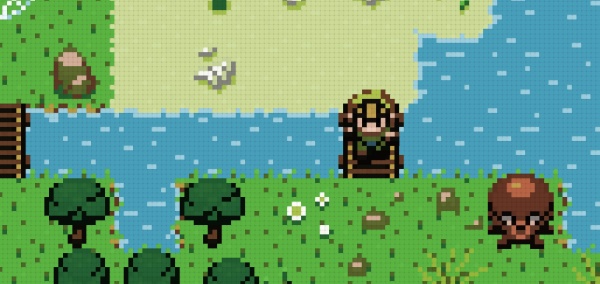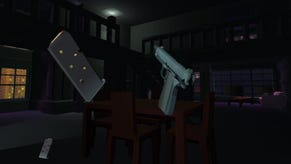Wot I Think: Evoland
Creationism
Beginning life as a LudumDare #24 winner, Evoland is now a complete, released game, that sets you on a journey through RPG history. Literally. As you play, the genre evolves around you. Mixing together elements from Zelda, Final Fantasy, Dragon Quest and Diablo, is the result the sum of its parts, or falling through the cracks between? Here's wot I think.
Evoland could have been just a gimmick. It would have gotten away with it too, so strong is that gimmick. But impressively, this playable tour through the history of Zelda-like RPGs manages to feel like a game in itself at the same time.
Starting off in black-and-green, your character - only named once you've evolved enough through the genre for such things - begins only scrolling left and right. By opening chests, new innovations in console RPG gaming become unlocked. These take the form of big leaps, like updating to 16-bit graphics, and tiny details, like the inclusion of volumetric lighting. And they especially effect the style of game you're playing, as you drift from GameBoy-ish simplicity to Diablo-esque complexity.
It's risky territory, riffing off clichés of a genre. Ironically embracing the most familiar tropes tends to ensure your game is a collection of tired tropes. But Evoland, to an extent, avoids this reasonably well. There are a couple of underground dungeons, replete with traps, collapsing floors and combat challenges, but they tick two important boxes. 1) they're fun. 2) there are two of them.
It's this smartness with balance, throwing in references but not labouring them, that gives Evoland its charm. Except for, and wow is this a big one, bloody random encounters.
The game mixes combat styles along with everything else. Often you'll be equipped with your sword, and later bows and bombs, running around in real-time, swishing at the baddies. Depending how far through history you've advanced, you'll be running on the axes, then given free movement, and eventually in the game's best moments, the ability to "time travel", switching back and forth between its most modern rendition of 3D, and its 16-bit, top-down nostalgia. (Switching between the modes changes what you can access based on graphical rules, setting up some splendid puzzles, and creating a section that really stands out as an idea worthy of a game of its own.) However, other times you'll be in a more JRPG-styled turn-based combat, you on the right, enemies on the left, choosing attacks and defences from a list. Much later on, the combat gets properly frantic, even throwing in a few nods at combos.
And it's those JRPG moments that are a millstone around Evoland's neck. Whatever you feeling about random encounters in RPGs, whether you think them a wonderful inclusion or a bunion on the raspy foot of gaming, they're rubbish here. The reason they work is because of their intricacies, the threat of failure, and the joy of judiciously reached success. None is on offer here, with none of the 67 billion encounters offering a glimmer of threat, but rather a tiresome chore to wade through, over and over and over and over and over and over again, just because you wanted to run from one point on the larger-scale map to another. While for a lot of this you have a companion character (who also nicely teases the ways of companion characters in games), each has literally one attack for most of the game. There's absolutely no fun to be found here, none of the rest of game's twinkly-eyed humour, but instead a tedious slog that interrupts your fun.
Were they only to appear as you made your way along the plot's route, then I think it would have been fine. A game like this could hardly not chronicle such combat (although I fail to see why it couldn't have added some more interesting attack choices, and indeed made any of the battles even vaguely difficult). But unfortunately, another of Evoland's finest features is some good reason to go back to previous areas. As you play, various bonuses are inaccessible, hidden behind rocks you can't yet blow up and the like. So as you advance once more, there's the opportunity to go back and search out what you had to miss. Except, to do that involves having to traipse across the random encounters maps every time, interrupted every few seconds with a battle you aren't going to lose, nor have any fun not doing so. Such that I just gave up on the notion, infuriated.
Quite why one of the chests couldn't have added in a quick-travel map I've no idea. Unless I missed such a thing, of course, but I was fairly comprehensive.
Other issues? Well, the most unfair one would be a criticism of how far forward its chronology reaches. Clearly, as an indie project, there wasn't going to be the resources or budget to create something as rich and graphically detailed as a PS3-style action-adventure RPG. But it's still a shame that things seem to finish in an early Gamecube era. I had hoped at one point that rather than unreachable fidelity, it might instead opt for some entertaining guesses as to where the genre might go next. But there's nothing like that here. The other issue could perhaps be argued to be part of the game's tribute ways, but bad checkpointing before multi-stage boss fights are never endearing. It only took me three goes to defeat the final boss, so it wasn't horrendous, but I've yet to relish the opportunity to play the same section of game again, three minutes after the last time.
Grumble grumble, but you'll understand that it's because it's stuff that gets in the way of Evoland being the charming pile of loveliness it should be. Yes, the story's nonsense, but it's supposed to be, and wittily done. Finding two halves of an amulet, searching for an ancient evil, etc etc. What this is really about is that excellent gimmick, rendered so very well: walking your way through the history of a particular branch of RPG, and not only getting to see those advancements having their effect on the world around you, but at the best moments, those differences becoming part of the game themselves.
It's £7, and will last you maybe three or four hours. most of which are very enjoyable indeed.










